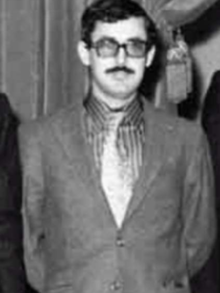Umar Muhayshi
Umar Abdullah el-Muhayshi (died January, 1984) was a Libyan army officer and a member of the Libyan Revolutionary Command Council that ruled Libya after the coup d'état of 1 September 1969.
Umar Muhayshi | |
|---|---|
 | |
| Personal details | |
| Born | 1940s Misurata |
| Died | January, 1984 Abu Salim prison[1] |
| Cause of death | Blunt trauma |
| Nationality | Libyan |
Life
Born to a family of Circassian and Turkish origin,[2] Umar Muhayshi was member of the group of army officers called the Free Officers Movement that brought the royal regime in Libya down on 1 September 1969.[3] He became a member of the twelve-member Libyan Revolutionary Command Council, headed by Muammar Gaddafi. He was promoted to the rank of Major after the revolution. After the establishment of the Libyan People's Court in October 1969, he represented the attorney-general at the court.[4]
In August 1975, Gaddafi's regime announced that an attempted coup d'état had been forestalled. All thirteen leading conspirators were members of the Free Officers Movement and four of them (Muhayshi, Bashir Houadi, Abdul Munim el Houni and Awad Hamza) were members of Revolutionary Council.[5] By that time Muhayshi was already outside Libya. Between 1976 and 1983, he lived in Egypt, Tunisia and Morocco. While he was in Egypt, some sources said that Gaddafi's regime tried in vain to assassinate Muhayshi more than once.[6]
In 1983, while Muhayshi was in Morocco, then under King Hassan II, the Moroccan authorities delivered Muhayshi to Gaddafi.[7] Muhayshi was murdered in January 1984 under torture by Sa'eed Rashid according to Abdel Rahman Shalgham.[8][9]
Notes
- http://archive.libya-al-mostakbal.org/MalaffatKhassa/adrar_nafosa_almheeshi_101209.html
- Ahmida, Ali Abdullatif (2013), Forgotten Voices: Power and Agency in Colonial and Postcolonial Libya, Routledge, p. 79-80, ISBN 1136784438
- Xinhua News
- el-Magariaf, p.256
- el-Magariaf, p.228
- el-Magariaf, p.858
- Al Wasat magazine
- Alhayat Newspaper (Arabic Language)
- el-Magariaf, p.469
References
- Mohamed Yousef el-Magariaf (2008). Libia men al Shar’iya ad Dustouriya elal Shar’iya ath Thawriya. Dar al Istiqlal & Maktabat Wahba, Cairo.
- Al Wasat magazine, London.
- "Backgrounder: Basic facts about war-torn Libya". Xinhua News. 2011-03-20. Retrieved 2011-03-31.